 |
B-57 Canberra
May Day... May Day...
12 January, 1966
© 1996, by Don Poss

|
 |
|

|
|
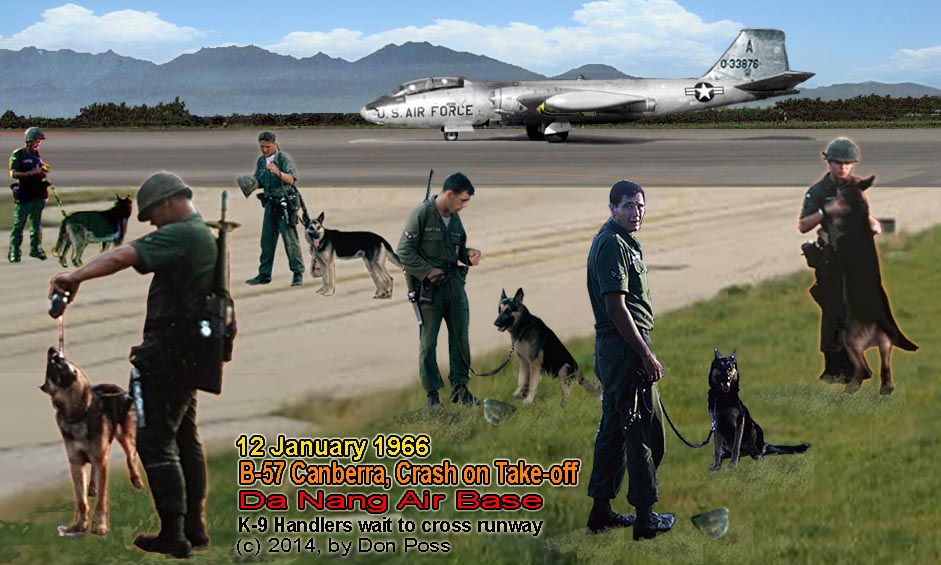
K-9 Handlers await the take-off of a B-57 Canberra, before crossing the active runway.
USAF K-9 Sentry Dog Handers:
L/R: Lee Miller, Shep A902; Tom Baker, Rex 9F97; Patrick Compton, Vaughn 826F; Gary Eberbach, Bucky A748; Don Poss, Blackie 129X.
Additional Handlers not shown
|
FORWARD: By June of 1965, the U.S. Air Force 3rd Bomb Group had moved to Đà Nàng AB to carry out night interdiction operations over North Vietnam and Laos. Principal targets were trucks, storage and bivouac areas, bridges, buildings and AAA sites. When deployed at Đà Nàng AB, the 8th and 13th Squadrons came under operational control of the 6252nd Tactical Fighter Wing which became the 35th TFW about a year later.
Combat attrition in the B-57 force, plus the increasing availability of higher performance fighters to carry out the air war against the North, caused the 3rd BG to be withdrawn from operations against the North in October of 1966 and relocated to Phan Rang AB, just south of Nha Trang AB and Phu Cat AB.
Out of the 94 B-57s that were assigned to the Southeast Asia theatre, 51 were lost in combat (including 15 destroyed on the ground). This is the story of the deaths of USAF Captain Leon Boyd Smith II (pilot) and Major Elijah Goar Tollett Jr (crew), who crewed one of the 51 B-57's lost. |
[History and
current status of the Martin
B-57 Canberra] |
Đà Nàng flight line, January 12, 1966:
6252nd Air Police Squadron, 366th SPS K-9 - As the sun began to sat in the west, a dozen K-9 sentry dog handlers waited at the north end of Đà Nàng's only active runway for a B57 Canberra to complete its taxi and wait for take-off clearance to join an orbiting flight for a mission north.
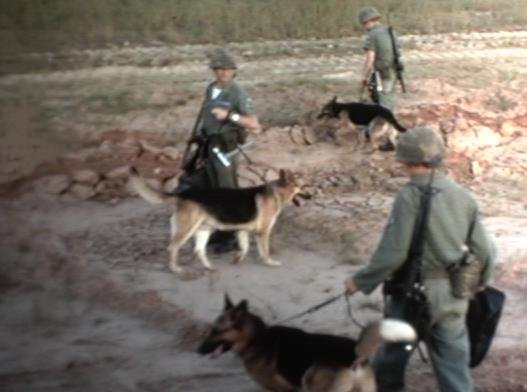 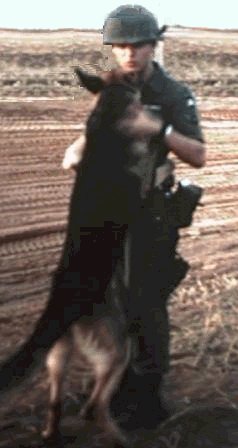 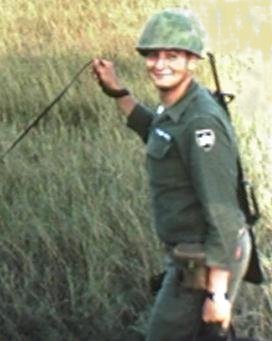 As soon as the tower gave us the green-light we could cross to the runway's west side perimeter and take up our posts every thousand feet. My sentry dog, Blackie (129X), was at heel, sitting patiently on my right side, and soon we would arrive on post between the 2,000 and 3,000 feet runway markers. As soon as the tower gave us the green-light we could cross to the runway's west side perimeter and take up our posts every thousand feet. My sentry dog, Blackie (129X), was at heel, sitting patiently on my right side, and soon we would arrive on post between the 2,000 and 3,000 feet runway markers.
|
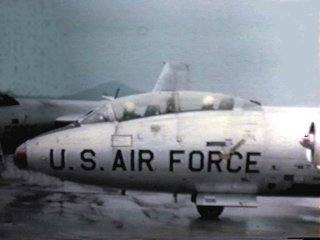 I watched for the pilots of the Martin B-57 Canberra, a tactical fighter bomber, to glance up from their preflight, as they almost always did, so that I could wave a thumbs-up. But this time, both were intently focused upon their instruments, glancing neither left or right. The bomber was fully armed for a bombing mission, and would join-up with other bombers orbiting nearby. Several minutes passed and something seemed wrong. I watched for the pilots of the Martin B-57 Canberra, a tactical fighter bomber, to glance up from their preflight, as they almost always did, so that I could wave a thumbs-up. But this time, both were intently focused upon their instruments, glancing neither left or right. The bomber was fully armed for a bombing mission, and would join-up with other bombers orbiting nearby. Several minutes passed and something seemed wrong.
The bomber was heavily armed with wing bombs, and its nose seemed to dip slightly lower than the normal nose-down rake attitude of a B-57.
When it began to roll forward, the nose sagged a little further. The B57 Canberra fighter-bomber lumbered down the runway, picking up speed, with dual engines roaring. All of us sentry dog handlers followed its acceleration--we sensed that it was not a typical take-off, and we were right. |
The Canberra passed what should have been a point of no return and committed to take off and vertical rotation that would lift the nose to a high attitude. Suddenly the nose gear collapsed onto the asphalt runway--trailing sparks and fireworks, like a thousand giant sparklers burning at once.
We knew the B57 pilots could not eject at ground level because it had the old cannon shell ejection seats that would literally blow the pilots out of the cockpit and throw them onto the runway in front of the still accelerating aircraft. The pilot was obviously fighting to control the aircraft and managed to lift off the runway. For several seconds the nose lifted high, then settled back and pancaked on the runway with a screeching shower of sparks like a comet's tail skipping across a lake of fire. Racing ever closer to the south end of the runway, it was lift off or die-time for the pilots.
Please God... I prayed, willing it into the air. |
| |
| |

VSPA
is an association for USAF
Vietnam War Veterans who
served in
Vietnam or
Thailand from
1960-1975,
as Air Police / Security Police or as an Augmentee.
Visit the main pages for
information on joining. |
| |
|
|
|

